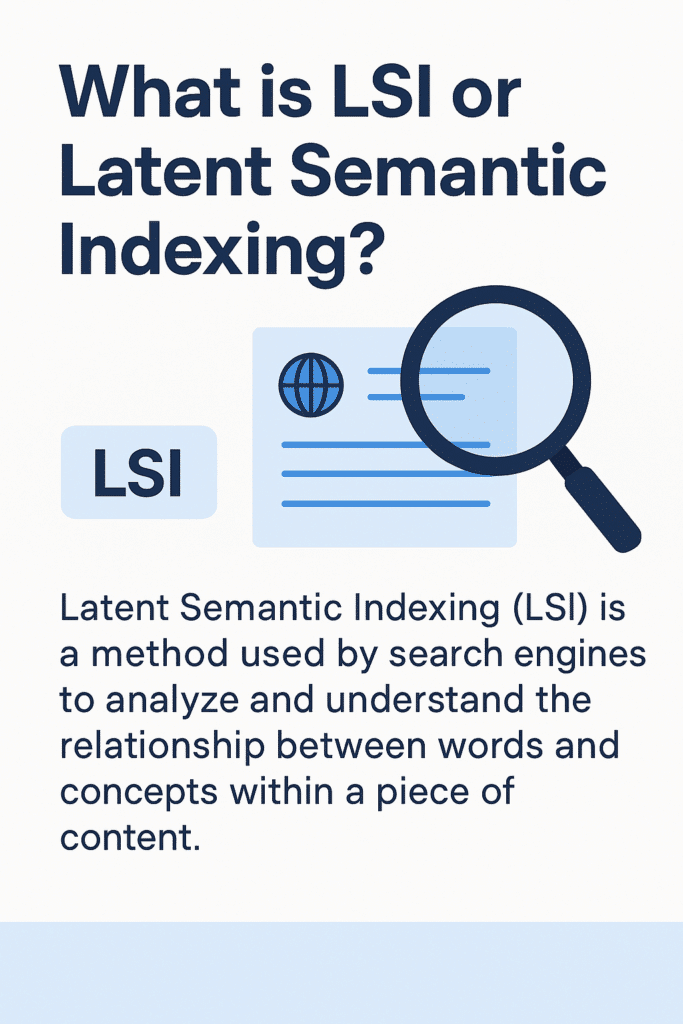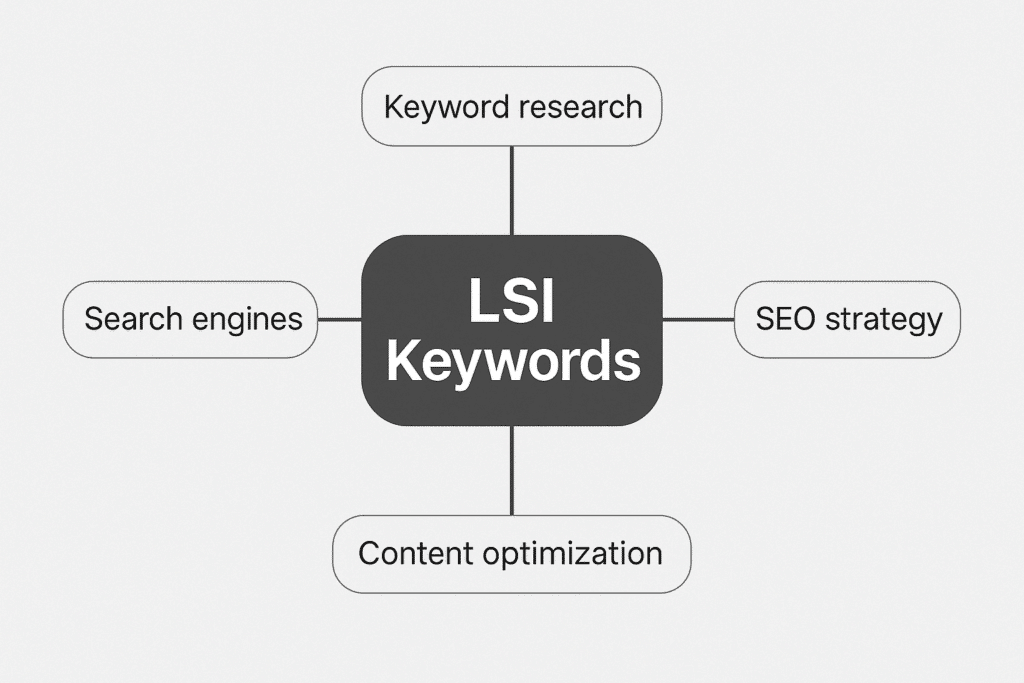

Struggling to rank your content even after targeting strong primary and secondary keywords?
The problem might not be your keywords, but how you’re using them in your content. Sometimes using too many keywords leads to keyword stuffing, which negatively impacts your website pages. You don’t need more keywords, you need LSI keywords.
LSI (Latent Semantic Indexing) is a method used by search engines to analyze and understand the relationship between words and concepts within a piece of content. It helps search engines determine the context and relevance of a webpage about a user’s search query.
It signals to search engines that your webpage is relevant and valuable for certain queries. Using LSI Keywords can also help you avoid keyword stuffing penalties while ensuring that your content contains relevant terms related to your target topic. Want to know more about how LSI affect search engine ranking? Why is it so relevant, and how can to incorporate LSI keywords into content? Keep reading this blog to learn how LSI keywords can transform your SEO results.

Before going deep into LSI usage and significance, let’s understand what LSI is.
Latent Semantic Indexing (LSI) is a computer technology created in the late 1980s to help find useful information from large amounts of data. It works by finding hidden relationships between words using a method called Singular Value Decomposition (SVD). This technique empowers computers to learn and understand diverse texts just as humans do.
Essentially, LSI acts as a bridge between machines and human-like comprehension of textual information. It allows search engines to go beyond simply matching keywords and delve into the deeper semantic connections within a document. By analyzing the relationships between words, LSI enables computers to grasp context, infer meanings, and provide more relevant and accurate results during information retrieval.
LSI keywords, or latent semantic indexing keywords, are important for search engine optimization (SEO). These keywords are words or phrases conceptually related to a target keyword.
For example, if the target keyword is “credit cards,” some LSI keywords could include “money,” “credit score,” and “interest rate.” Including these semantic keywords in your content can help search engines understand the context and relevance of your page.
Significance of LSI Keywords
Although Google has stated that it does not use latent semantic indexing to rank search results directly, it does employ other forms of semantic analysis to understand the content of a page. By incorporating semantically related keywords in your content, you can signal to Google and other search engines what your page is about and improve its chances of ranking higher in relevant searches. Consequently, using LSI or semantic keywords can enhance your website’s overall SEO strategy and visibility online.
Latent Semantic Analysis (LSA) is a mathematical approach to uncovering the hidden meaning between words within a body of text. By analyzing the statistical patterns and relationships between words, LSA can identify related concepts and determine their similarity. This allows for a more nuanced understanding of language, as it goes beyond simple keyword matching and considers the contextual usage of words.
The main goal of LSA is to capture the semantic knowledge that humans possess and apply it in computational models. The analysis starts by creating a matrix representing the relationship between every word in the text. Each row corresponds to a unique word, while each column corresponds to a document or sentence containing those words. By applying mathematical techniques like singular value decomposition (SVD), LSA reduces the dimensionality of this matrix and extracts latent (hidden) features that represent underlying concepts.
LSA has various applications, including information retrieval, automatic summarization, machine translation, and natural language processing tasks like sentiment analysis or text classification. By understanding the connections between different words based on contextual usage, LSA enables computers to comprehend human language better and make more accurate predictions or interpretations based on textual data.
Google considers LSI outdated and prefers NLP-driven semantic analysis to interpret user intent and content context.
In summary, Google doesn’t use LSI to rank content, but LSI keywords make content more relevant and query-oriented, it indirectly helps content to rank.
Find your LSI Keywords with these simple steps:
Keywords contribute 15% to a page’s overall ability to rank and you’re not sure how to do keyword research for your business? Let our SEO experts help you in keyword Analysis.
The role of LSI (latent semantic indexing) keywords in SEO ranking is still a matter of debate among SEO specialists.
Experts Against LSI
Some experts argue that LSI keywords do not directly impact SEO, so optimizing for them is optional. Clark Boyd, an experienced SEO specialist, falls into this camp and believes that other factors, such as site structure and backlinks, are more important for SEO success.
Experts Support LSI
On the other hand, some proponents strongly advocate for the importance of LSI keywords in SEO ranking. Ashton Kimberley and the team at Keysearch are among these advocates. They argue that LSI keywords are crucial in signalling to search engines that your content is relevant and will satisfy user intent.
Does LSI Rank Content?
While it is hard to determine with certainty how search engines like Google factor LSI keywords into their algorithms, it is clear that these keywords indirectly contribute to improved SEO ranking by helping search engines determine the relevance and usefulness of content.
In this sense, even if LSI keywords don’t directly impact rankings, they support the overall goal of providing users with valuable and relevant search results.

Using LSI keywords on your website can greatly improve your chances of ranking higher in Google’s search results. While it may have been difficult for Google to implement LSI in their algorithm, it is surprisingly easy for website owners to incorporate LSI keywords into their content.
All you need to do is replace a few instances of your page’s main keyword with an LSI keyword. This simple substitution can provide additional context and relevance to your content, ultimately helping Google understand the intent and topic of your page more accurately.
Your primary keyword is “Best SEO WordPress Plugins”, and secondary keywords are “free SEO tools for WordPress, how to install SEO plugin in WordPress”
LSI keywords will be
These LSI keywords also help content to rank on Google and reduce keyword stuffing.
Although using LSI keywords should be done strategically, you shouldn’t overdo it. Adding an LSI keyword for every 300 words on a page is recommended as a general rule of thumb. While adding these keywords won’t guarantee that you will rank for them specifically, they can assist Google in comprehending the overall theme and subject matter of your page better.
In the early days of search engine optimization (SEO), keyword density played a significant role in determining the ranking of web pages. It was simply calculated by Keyword Density (%) = (Number of times the keyword appears / Total number of words in the content) × 100
This metric was seen as an indication of how relevant a web page was to a specific search query. Web pages with higher keyword density were often considered more and ranked higher in search results.
However, one major drawback of solely relying on keyword density was the emergence of keyword stuffing. Website owners and SEO practitioners began overusing keywords, cramming them into content unnaturally and excessively to manipulate search engines and gain higher rankings. It was common to find web pages with very high keyword density, from 5 to 10 per cent or more.
This resulted in a poor user experience and diminished the quality of online content. As search engines evolved and became smarter, they recognized this practice and penalized websites with excessive keyword usage. While keyword density still plays a role in SEO, it is no longer the sole determinant for ranking as search algorithms have become more sophisticated in evaluating relevance and quality factors beyond mere word count.
LSI, or Latent Semantic Indexing, are crucial in improving your search engine ranking. You can signal the search engines that your content is comprehensive and valuable by incorporating them.
Remember, implementing LSI keywords is just one piece of the SEO. Let our experts handle the rest and assist you to make your business visible on search engines.
Contact Stellites Technologies and let your business grow with experts!!
What is Latent Semantic Indexing (LSI)?
LSI is a technique used by search engines to understand the relation between words and concepts within a piece of content. It helps search engines determine the context of a webpage and categorize it accurately.
How do LSI Keywords benefit SEO?
LSI keywords are semantically related terms that help search engines understand a webpage’s theme. LSI keywords attract more organic traffic for related search queries and improve your website’s visibility in search engine rankings.
How do LSI Keywords differ from regular keywords?
While regular keywords are the primary terms you target for SEO, LSI keywords are related terms that give context and enhance the meaning of the primary keyword. They make content more comprehensive and relevant to a search query.
Does Google still use Latent Semantic Indexing (LSI)?
No, Google no longer uses LSI, as it is considered outdated technology. However, Google does use other forms of semantic analysis, such as natural language processing and machine learning algorithms, to understand the context and meaning of content.
How do I find LSI Keywords for my content?
To find LSI keywords, brainstorm related topics, subtopics, and variations of your main keyword. You can also use keyword research tools like Google Keyword Planner or SEMrush to discover semantically related keywords.
How do LSI Keywords impact my website’s SEO ranking?
Although LSI keywords don’t directly affect rankings, they make your content more relevant to search engines. Including LSI keywords helps search engines better understand your content, which improves your content’s ranking.
Are LSI Keywords difficult to understand and use?
No, LSI keywords are simple to understand. They are simply terms that are naturally related to your main keyword. If your primary keyword is “Best SEO plugins for WordPress”, LSI keywords will be
– WordPress SEO tools
– Top SEO Plugins for WordPress
– Free SEO plugins for WordPress
Schedule a Call and Get a 7-Day Free Trial
No Credit Card Required
Schedule a Call and Get a 7-Day Free Trial
No Credit Card Required
What’s Included in the Trial:
✓7 days of work across six key technologies
✓Access to premium tools needed for your projects
✓No questions asked if you choose not to continue afterward
✓Transparent communication with daily progress updates
✓Fast turnaround to help you meet tight deadlines
✓ Opportunity to test our workflow and collaboration process firsthand
Stellites partners with digital agencies as a white-label provider for their talent and development needs. We offer top-tier professionals in Digital Marketing, SEO, Paid Advertising, as well as WordPress, Shopify, and other platforms—available on a full-time or pay-as-you-go basis.
At Stellites, our white-label development services are designed to deliver 100% pixel-perfect and technically complex projects within competitive timelines, allowing your agency to scale effortlessly and impress your clients.
Stellites partners with digital agencies as a white-label provider for their talent and development needs. We offer top-tier professionals in Digital Marketing, SEO, Paid Advertising, as well as WordPress, Shopify, and other platforms – available on a full-time or pay-as-you-go basis.
At Stellites, our white-label development services are designed to deliver 100% pixel-perfect and technically complex projects within competitive timelines, allowing your agency to scale effortlessly and impress your clients.
COPYRIGHT © 2025 Stellites Technologies. All Rights Reserved.
Get 15% Discount on all product
Enter your email to receive your exclusive coupon and start saving on your next purchase. Don’t miss out on special deals and updates!
[contact-form-7 id="702acf5" title="Get Coupon Code"]